In just four months, the mosquito-infested, stench-filled slum scripted a success story that even got Chief Minister Devendra Fadnavis's attention and is now described as a model everyone can follow
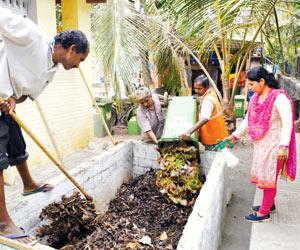
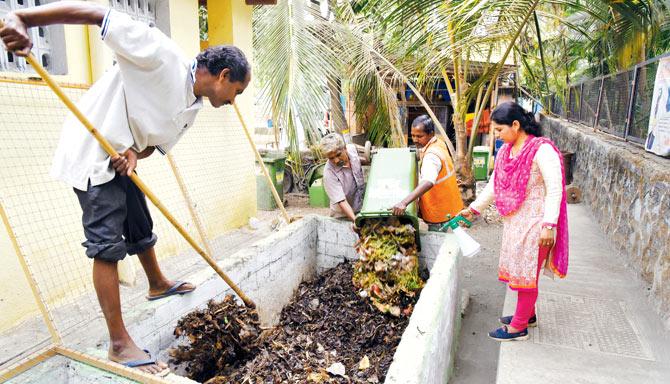
Ashwini Borude oversees the composting work at the Kandivli slum. Pic/Nimesh Dave
At 8 am, when the din of the city is barely audible, and the only sound emanating from Bhadranagar Madrasi Chawl in Kandivli East is that of a rooster and his brood of scrambling hens, Ashwini Borude makes her way through the narrow gullies of the slum colony. Ahead of her are four men, who call themselves safai mitra, wheeling two large green cans each. Borude, who is a member of Shri Aastha Mahila Bachat Gat, a community-based organisation (CBO) that works with the civic body, keeps a close watch, as they split into different directions to pick up waste from the doorstep of every home.
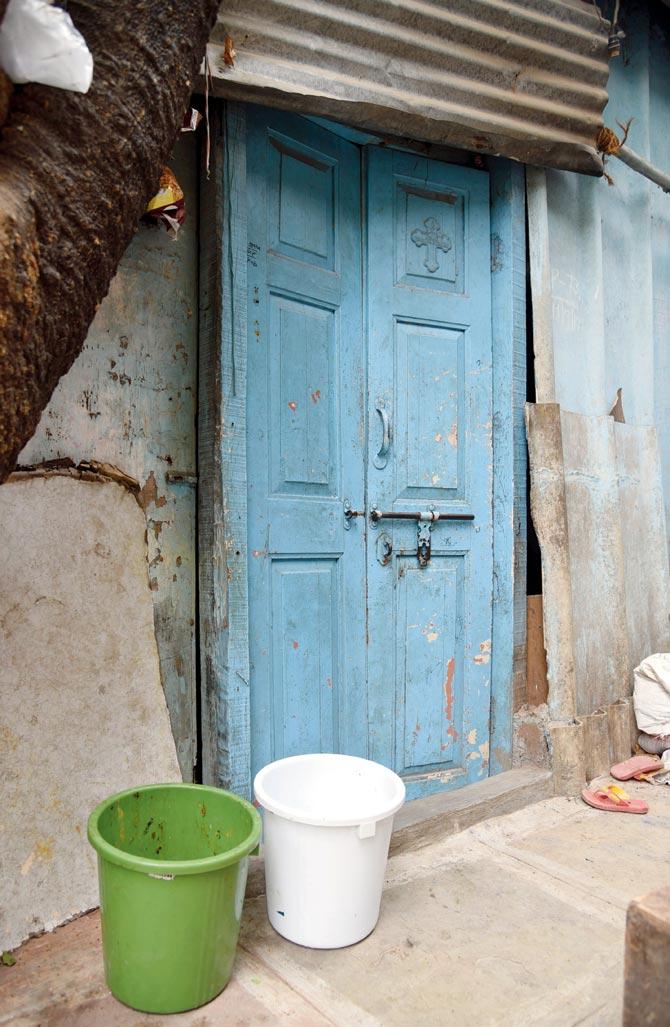
The green bin for wet waste and white bin for dry waste at Kandivli's Bhadranagar slums
There are 185 houses in all. As the minutes tick by, she realises that the task won't be complete until another two hours. "It's tedious," she tells us. "We have to be careful about not mixing the waste." But, under her eagle eye, the chance of this happening is next to impossible. Borude, who lives in a neighbouring basti, Irani Wadi, has invested all of November last year, educating the reluctant, 900-strong population of slumdwellers in Bhadranagar about dry and wet waste. If that wasn't enough, she also utilised money from the measly funds made available under the BMC's Swachha Mumbai Prabodhan Abhiyan (SMPA) scheme to secure two plastic bins for each home — white for dry waste and green for wet. When she had managed to convince residents of why they needed to segregate waste — a task that she admits was Herculean — Borude went on to give the area a clean sweep, one which also included getting them to set up their own bio-composting unit.
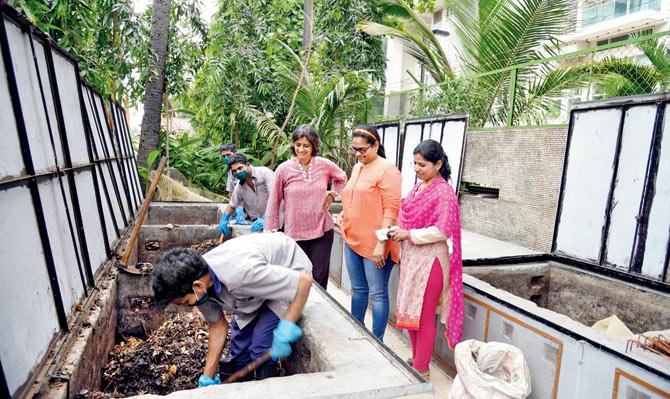
Ashwini Borude (right) oversees work at the composting pit at Whispering Palms Xxclusive in Kandivli. Pics/Nimesh Dave
In the span of just four months, the slum has scripted a success story that has not just received statewide attention — Chief Minister Devendra Fadnavis recently tweeted about it — but, has also been described as a model that should be replicated by those spearheading PM Narendra Modi's Swachh Bharat Abhiyan. Bhadranagar, however, is just one, among many other slums in the city, showing the way forward for residential societies and buildings facing the wrath of the BMC for not being able to segregate garbage, as part of its zero-garbage initiative.
Mission clean-up
Late last year, after a 17-year delay, BMC decided to implement the Municipal Solid Waste Management, Rules, 2000, which made it compulsory for all local bodies to scientifically treat waste, and provide infrastructure for its segregation, collection and transportation. While the initiative met with stiff resistance, a much-determined BMC stopped collecting garbage from these societies, forcing them to find a resolution, or deal with the stink. For the BMC, the best case in point was Mumbai's slums, which were slowly, but steadily setting up a revolutionary example, under the SMPA mission, which was launched in January, 2013.
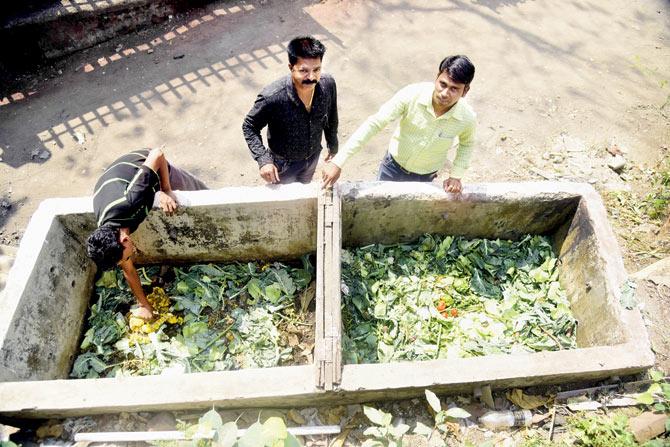
The waste is put into the composting pits at Kanjurmarg’s Ashirwad Niwas and Mirashi Nagar slums. Pic/Sameer Markande
Subhash Dalvi, who is the officer on special duty for the Swachh Bharat Abhiyan and Solid Waste Management in the BMC, explains that slum cleanliness is done through CBOs from the area under the SMPA.
This scheme is implemented in 9,991 slum units — each unit comprises 150 families or a population of 750 people — in the city, said Dalvi, who is chief nodal officer of SMPA. The CBO, which is appointed every six months through a lottery system, is tasked with collecting and segregating the waste in the slums, with the help of residents. The BMC provides Rs 5,400 as grant for materials and an additional Rs 600 to organise awareness campaigns every month for each unit, in order to help them set up a waste collection plan.
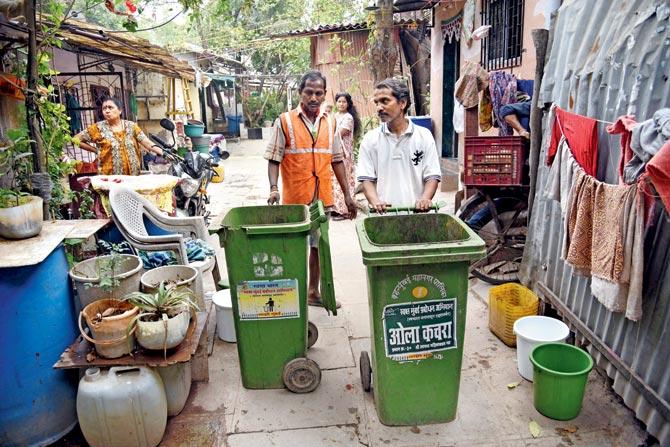
Safai mitras at the Bhadranagar slums in Kandivli, who collect the wet and dry garbage in separate wheelie bins. Pics/Nimesh Dave
While the programme has existed for five years now, Dalvi and his team, under the leadership of Vijay Singhal, assistant municipal commissioner, BMC, recently decided to encourage slums to adopt the zero-garbage plan, under the scheme. While conducting R&D on composting, Dalvi, who has been practising bio-composting in his Vile Parle home, learnt of two processes — the bio-culture system for cooked food waste and the vermiculture system for uncooked waste or green waste. Accordingly, Dalvi decided to train CBO leaders to carry out the same in their slum units. The CBOs, in turn, have gone on to pen inspirational stories.
Slums show the way
At Bhadranagar, Shri Aastha Mahila Bachat Gat transformed the way residents live. Borude, who is the chairman of this CBO, recalls her group being nominated for the garbage collection drive in October last year. At the time, the gullies were ridden with open drains, and infested with rats and mosquitoes. Vimla Mary Vanniyar, 35, who moved here 12 years ago, says the locals were used to living in filth. "Changing this mindset required both patience and time," says Borude. Her team conducted street plays, held painting competitions for children themed around cleanliness, and also went door-to-door to spell out the advantages of segregating waste, and the benefits of having their own composting plant.
Saraswati Kaundar, 51, a resident of the basti, recalls Borude visiting them several times, and explaining the benefits of waste segregation. "But, we would insult her and drive her away. We told her that if she was interested, she could come and separate our garbage herself," says Kaundar, embarrassed by how unyielding they were.
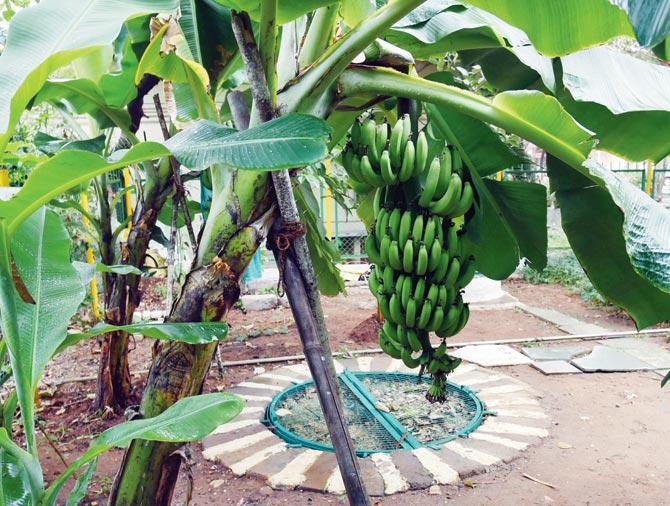
Bananas growing at Cooper Hospital, fertilized by compost created on the premises
It would take another month before the residents would agree. Soon after, they sought aid from the BMC and local corporator Leena Patel to repair the drains and public toilets. This was important, as they had chosen a site behind the toilets to build the composting unit. The area, which had been rendered unusable due to leaking sewers, has now been refurbished. Every day, post 10.30 am, all the wet garbage that is collected is dumped into this tank. A safai mitra — for whose services each family shells out R20 every month — then churns the garbage with the help of a prong. Borude, who oversees the entire process, sprays the culture — a chemical that accelerates aerobic composting. The process lasts a few minutes, she says. "In the span of two months, our way of life has changed. Our basti doesn't look like a slum anymore, and even our kids, who used to fall ill every now and then, are healthier," says Kaundar. "I was raised here, and so was my mother and hers, but I don't remember breathing such clean air. It took us four generations to get here."
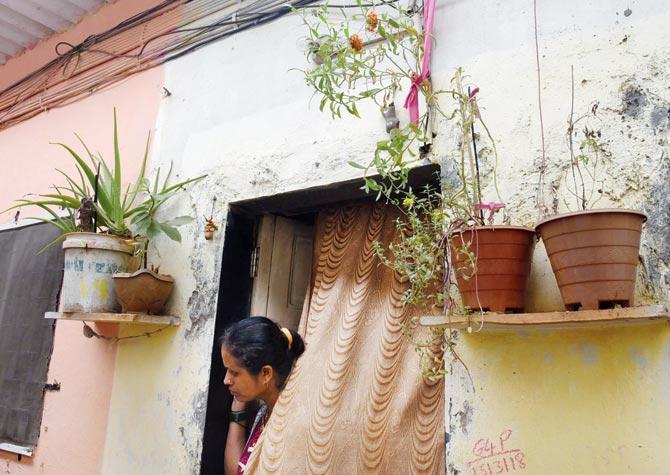
Residents of slums in Ghartan Pada in Dahisar use the compost for their plants
Inspiring neighbours
Not far from there, Suhyog Nagar, Ghartan Pada in Dahisar, a basti comprising 250 homes, was quick to get inspired. After repeated visits and consulting sessions offered by Vilas Tambe, junior overseer, Solid Waste Management (SWM) department of the BMC and his team, the residents began to see the benefits of waste segregation and composting. So much so that Tejaswi Sawant, a resident of the basti, gave up an area she owned for the composting unit. "It was lying empty, and people would be dumping waste there anyway. When I understood the benefits of composting, I thought why not use this space for it," she tells us. And, that was a crucial move. "We have been composting since last October and the residents are pleased with the outcome. There was barely any space to build a compost pit here; without Tejaswi's contribution this would not have been possible. But, when you explain that it's for a good cause, everyone wants to do their bit. Almost 90 per cent of the residents have come around," Tambe says. The nearly clean nulla that encircles the basti testifies his claim. There's negligible waste floating on it and therefore it does not stink at all. Now, the composting generates around 50 packets of manure every month. Weighing 250 gms each, they are distributed back among the residents to be used for gardening purposes.
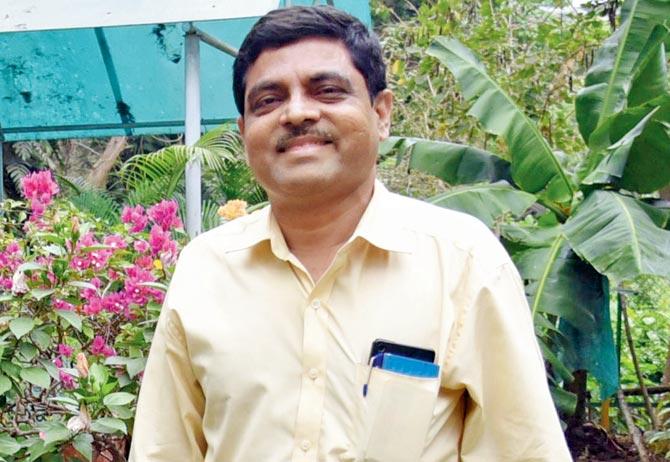
Subhash Dalvi, chief nodal officer of the Swachha Mumbai Prabodhan Abhiyan
Long before waste management was a part of everyday parlance, residents of Ashirwad Niwas and Mirashi Nagar slums in Kanjurmarg East had made it a way of life. It's all thanks to Dilip Patil, who now works as supervisor of Mansi Nagrik Mahila Oudogik Sangstha, a collective that oversees hygiene and sanitation in the 13 units under their jurisdiction. Patil has been working towards waste segregation since 2003. Since then he has been making efforts to raise awareness on the subject among the 500 families that reside in the area. They built their first composting unit three years ago. "I would go from home to home trying to explain to residents the benefits of waste segregation. It has taken us decades to look this clean," Patil said.
Nevertheless, not everyone is supportive of the initiative. Even after three years of composting, there are still a few residents who don't segregate waste. "They put it in the same bag and then we spread it out on a plastic sheet and segregate it bit by bit. We want to bring about change as peacefully as possible, without getting into fights and squabbles," says the 58-year-old Patil, who would initially pay the garbage collectors from his own pocket, until funding from BMC came by a few years ago. Daily, he leaves at 7 am and works till 2 pm in the afternoon, to ensure the waste is collected and composted as per norms. "I feel proud when foreign tourists visit our basti and appreciate how we have maintained it. We were the first in Mumbai to put waste segregation to practice," Patil said. He, however, is not a fan of the six-month lottery system. "Six months is too short a time, I feel. Besides, for someone who is doing good work, why remove him after six months? The lottery system should be for those whose work is yet to meet desired results," he said.
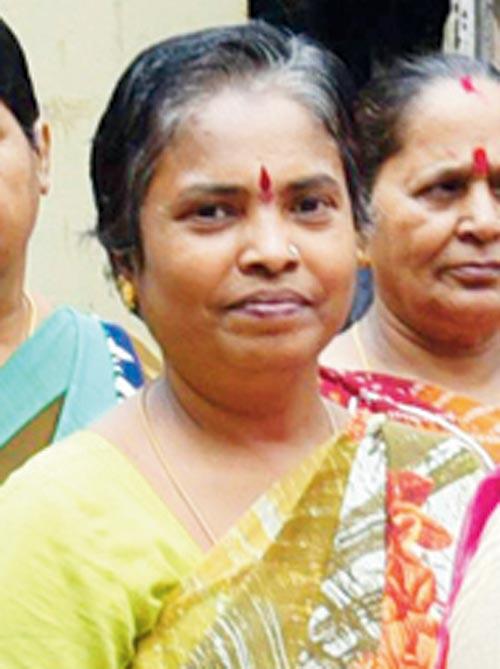
Saraswati Kaundar, 51, a resident of Kandivli slum
A role model for the rest
Earlier this month, Dalvi received a desperate message from Arathi Manay, 48, a resident of Whispering Palms Xxclusive in Kandivli East. The plush residential society, which comprises around 300 flats, generates around 300 kg of wet waste daily. After the BMC stopped collecting their garbage in January this year, the society was forced to implement a plan for garbage disposal. Manay, who helms the waste segregation initiative, along with Sameera Vakil, 41, decided that bio-composting was the best way forward. A site near the entrance gate of the building was used to build the tanks. "When doing bio-composting, you are supposed to balance wet waste with dry, so that it doesn't stink. Also, it needs enough aeration. Unfortunately, the volume we were generating was in excess, and though I have done composting at home for the last 10 years, it seems like we had been doing something wrong because of which the entire area would stink," says Manay.
Showing how it's done
After residents on the ground and first floors started complaining about the stench, a desperate Manay reached out to Dalvi. His immediate and best resource was Borude, who had successfully implemented the zero-garbage initiative in Kandivli. Manay and Vakil also visited the Bhadranagar slum, and experienced first-hand how bio-composting was done. Over the last two weeks, Borude has been helping the residents cut down on the stench. She stops by every day, after overseeing work at Bhadranagar, and sprays the culture, while advising the residents on how much dry material like coco peat (made out of coconut husk) and leaves should be added. "Their story was really inspiring. When we first adopted bio-composting, we weren't sure if it was the right move. There is a misconception that the more expensive your composting methods, the better. Many people suggested that we introduce electrical composters instead, but that would have defeated the purpose of sustainable living, which we intended to adopt. The basti's work has reassured us. If they can do it, I don't see why we can't," Manay said.
Wormi-culture
At Vile Parle's Cooper Hospital, 150 to 200 kg of wet waste is generated every day. In early 2016, Dalvi was at the hospital to visit a relative who was admitted there, when he struck up a conversation with the dean Dr Ganesh Shinde. "He expressed concern over the amount of waste the hospital was generating daily," Dalvi says.
Borude's team, which had successfully implemented vermiculture at the Irani Wadi basti in 2016, was once again employed to help with segregating the waste. A 2,000-square-metre garden space was available at the south end of the sprawling campus, where they decided to build the composting unit. Following the Irani Wadi model, a slightly larger unit was built, 14 feet long, seven feet wide and two feet-six inches deep. "It took us 15 days to build it. The trick was to arrive at a method wherein the worms would not be needed to be handled. So, the unit has compartments with passages through which the worms can move around, thereby aerating the whole area," says Borude, who visits the place every two days. While creating the vermibed for the compost, she held the earthworms in her bare hands. "I had done it while preparing the Irani Wadi compost as well. Initially, I would be scared, yes.
But now I"ll say it's a great feeling to hold thousands of worms in your hands, especially when you know that it is for a great cause." With the help of volunteers at Cooper, she prepared the vermibed that comprises sugarcane waste, cow dung and cow urine. "You need to make it fit for the worms to settle comfortably. And, to that, we added the uncooked wet waste. I was following the same method that I used at home, and it worked," Borude says. The excess water, or the vermiwash, is collected through an outlet and used to water the plants in the garden. The compost is used for the 2,000 trees that dot the hospital's campus. "We have a team of engineers of our own, who along with the mahila sangh has helped build an effective garbage segregation model, which we hope other hospitals will follow," Dr Shinde said.
Naveen Kumar Agarwal, director of the Swachh Bharat Abhiyaan for the Government of India, who visited the Kandivli basti in December last year, says that Mumbai's slums are proving how 'zero waste' is not an impossible target to achieve. "It's [Bhadranagar] a first-of-its-kind transformation to have taken place in the entire country, and if other residential societies in Mumbai and elsewhere follow in their footsteps, it will change the picture of the nation very soon," he said.
Also read: BMC gives three-month extension of garbage composting rule to housing societies, restaurants
Catch up on all the latest Mumbai news, crime news, current affairs, and also a complete guide on Mumbai from food to things to do and events across the city here. Also download the new mid-day Android and iOS apps to get latest updates
 Subscribe today by clicking the link and stay updated with the latest news!" Click here!
Subscribe today by clicking the link and stay updated with the latest news!" Click here!







